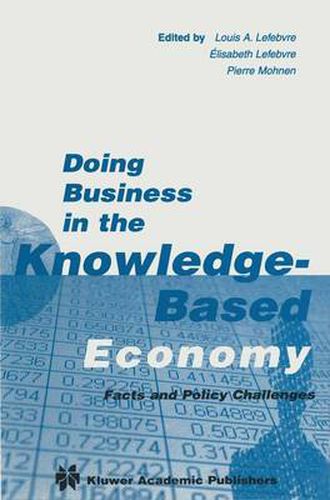Readings Newsletter
Become a Readings Member to make your shopping experience even easier.
Sign in or sign up for free!
You’re not far away from qualifying for FREE standard shipping within Australia
You’ve qualified for FREE standard shipping within Australia
The cart is loading…






This title is printed to order. This book may have been self-published. If so, we cannot guarantee the quality of the content. In the main most books will have gone through the editing process however some may not. We therefore suggest that you be aware of this before ordering this book. If in doubt check either the author or publisher’s details as we are unable to accept any returns unless they are faulty. Please contact us if you have any questions.
On September 17 and 18, 1998, a conference took place at Mont Tremblant on the theme Doing Business in a Knowledge-Based Economy. This conference brought together some hundred participants from government, business and academia, with backgrounds in business administration, engineering, public administration and economics, to provide a multidisciplinary analysis of what has come to be known as the Knowledge-Based Economy (KBE). The aim was to come up with suggestions and recommendations about how to do business in a knowledge based economy, both at the firm level and at the government level. All presenters were explicitly asked to conclude with policy recommendations. The conference was sponsored by Industry Canada and organized by the Centre of Interuniversity Research on the Analysis of Organizations (CIRANO). The conference papers offered U.S., Canadian and European perspectives on the management of a knowledge-based economy. This volume is divided into three parts. The papers in part I set the stage by describing the salient features of the KBE. What is so special about it? What are its economic underpinnings? What are its technological characteristics? Knowledge plays a crucial role in a KBE, hence its name. Whereas, in the past, growth was determined primarily by the availability of land, natural resources, labour and capital successively, at the end of the twentieth century, knowledge has become a (if not the) major factor of economic growth.
$9.00 standard shipping within Australia
FREE standard shipping within Australia for orders over $100.00
Express & International shipping calculated at checkout
This title is printed to order. This book may have been self-published. If so, we cannot guarantee the quality of the content. In the main most books will have gone through the editing process however some may not. We therefore suggest that you be aware of this before ordering this book. If in doubt check either the author or publisher’s details as we are unable to accept any returns unless they are faulty. Please contact us if you have any questions.
On September 17 and 18, 1998, a conference took place at Mont Tremblant on the theme Doing Business in a Knowledge-Based Economy. This conference brought together some hundred participants from government, business and academia, with backgrounds in business administration, engineering, public administration and economics, to provide a multidisciplinary analysis of what has come to be known as the Knowledge-Based Economy (KBE). The aim was to come up with suggestions and recommendations about how to do business in a knowledge based economy, both at the firm level and at the government level. All presenters were explicitly asked to conclude with policy recommendations. The conference was sponsored by Industry Canada and organized by the Centre of Interuniversity Research on the Analysis of Organizations (CIRANO). The conference papers offered U.S., Canadian and European perspectives on the management of a knowledge-based economy. This volume is divided into three parts. The papers in part I set the stage by describing the salient features of the KBE. What is so special about it? What are its economic underpinnings? What are its technological characteristics? Knowledge plays a crucial role in a KBE, hence its name. Whereas, in the past, growth was determined primarily by the availability of land, natural resources, labour and capital successively, at the end of the twentieth century, knowledge has become a (if not the) major factor of economic growth.